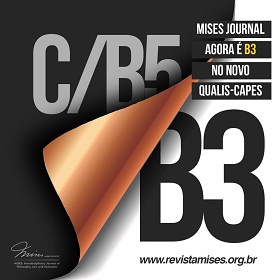As origens do movimento antitruste
A perspectiva de um grupo de interesse
DOI:
https://doi.org/10.30800/mises.2019.v7.1177Palavras-chave:
Antitruste, regulação, competição, monopólioResumo
Diversos estudos contemporâneos evidenciam a necessidade de introdução da competição nos setores de transporte, energia e outros mercados tidos como monopólios naturais, devido à ineficiência gerada pelos monopólios regulados por agências governamentais. Entretanto, pouco se estuda sobre as consequências da regulação conhecida como antitruste, remonta a um processo político protecionista do final do Século XIX, e que serviu de base para a maior parte da regulação governamental sobre diversas indústrias acusadas de praticas monopolistas. Neste artigo, são estudadas as origens do movimento antitruste como iniciativa política, analisadas as evidências sobre as indústrias acusadas de monopolização, e demonstrada a hipótese de pesquisa de que as regulações antitruste e suas derivadas têm mais restringido a competição do que melhorar o desempenho dos mercados através da correção de supostas “falhas de mercado”.
Downloads
Referências
ANDERSON, T.; HILL, P. The Birth of a Transfer Society. Hoover: Institution Press, 1980.
ARMENTANO, Wiley. R. Bork. New York: Wiley, 1982.
BORK, R. The Antirust Paradox. Basic Books, 1978.
BORK, R. Legislative Intent and the Policy of the Sherman Act. J. Law and Econ, v. 9, n. 16, 1966. DOI: https://doi.org/10.1086/466617
BROZEN, Y. Concentration, Mergers, and Public Policy. New York: Wiley, 1982.
CLARK, J. D. The Federal Antitrust Policy. Johns Hopkins University Press, 1931.
CLARKSON, K.; MILLER, L. Industrial Organisation and Public Policy. McGraw-Hill, 1982.
CONGRESSIONAL RECORD. 51º Congresso. 1ª Sessão. House, 1890.
DEMSETZ, H. Two Systems of Belief About Monopoly. Boston, 1974.
ELY, R. T. The Future of Corporations. Harpens, 1887.
FREY, B.; et. al. Consensus and Dissention Among Economists. American Economic Review, v. 74, 1974.
GOLDSCHMIDT, M.; MANN, F.; WESTON, F. Industrial Concentration: The New Learning. Little Brown, 1974.
GORDON, S. D. Attitudes Toward Trusts Prior to the Sherman Act. Southern Economic Journal, v. 20, 1963. DOI: https://doi.org/10.2307/1055962
GUNTON, George. The Economics and Social Aspects of Trusts. Political Science Quarterly, 1888. DOI: https://doi.org/10.2307/2139050
GRAY, R.; PETERSON, J. Economic Development in the United States. Irwin, 1965.
HAYEK, F. Law Registration and Liberty. Chicago: University of Chicago Press, 1979.
HAZLETT, T. Interview with George Stigler. Journal of Legal Studies, v. 46, 1984
HOWARD, M. Antitrust and Trade Regulation. Prentice Hall, 1983.
JOHNSON, M. B. Can Economic Analysis Give Better Guidance to Antitrust Policy? Economic Inquiry, v. 10, 1983. DOI: https://doi.org/10.1111/j.1465-7295.1983.tb00612.x
KEARL, C. et. al. A Confusion of Economists?. American Economic Review, v. 30, 1979.
LETWIN, W. Law and Economic Policy in America: The Evolution of the Sherman Antitrust Law. Chicago: University of Chicago Press, 1965.
MCGEE, J. McGee. Predatory Price Cutting: The Standard Oil (N.J.) Case. International Journal of Law and Economy, v. 137, 1958. DOI: https://doi.org/10.1086/466547
MCNULTY, P. A Note on the History of Perfect Competition. J. Political Economy, v. 10, 1967.
NEW YORK TIMES. New York Times de 1º de outubro de 1890: caderno 2, 1890.
NORTH, D. Growth and Welfare in the American Past: A New Economic History. Premice Hall, 1966.
PATTEN, Simon. The Economic Effects of Combinations. Age of Steel, 1889.
POSNER, R. Antitrust Law: An Economic Perspective. University of Chicago Press, 1976.
SCHERER F. M. Industrial Market Structure and Economic Performance. Rand McNally, 1982.
SHUGHART, R.; TOLLISON, R. The Positive Economics of Antitrust Policy: A Survey Article. Law and Economy, v. 39, 1985. DOI: https://doi.org/10.1016/0144-8188(85)90017-1
STINGLER, G. Economists and the Problem of Monopoly. American Economy Review, v. 9, 1982.
TOLLISON, R. et. al. The Antitrust Pork Barrel. J. Law and Econ, v. 25, 1982. DOI: https://doi.org/10.1086/467019
TOLLISON, R. D. The Political Economy of Antitrust. The Political Economy of Antitrust, Lexington Books, 1980.
TOLLISON, R. D.; MCCORMICK, R. Politicians, Legislation, and the Economy. In: MARTINUS, Nijhoff (ed.). Inquiry Into the Interest-Group Theory of Government. London: Rochester Studies, 1981.
WELLS, David A. Recent Economic Changes. New York: DeCapro Press, 1889.
Downloads
Publicado
Como Citar
Edição
Seção
Licença

Este periódico está licenciado sob uma Creative Commons Attribution 4.0 International License.



















